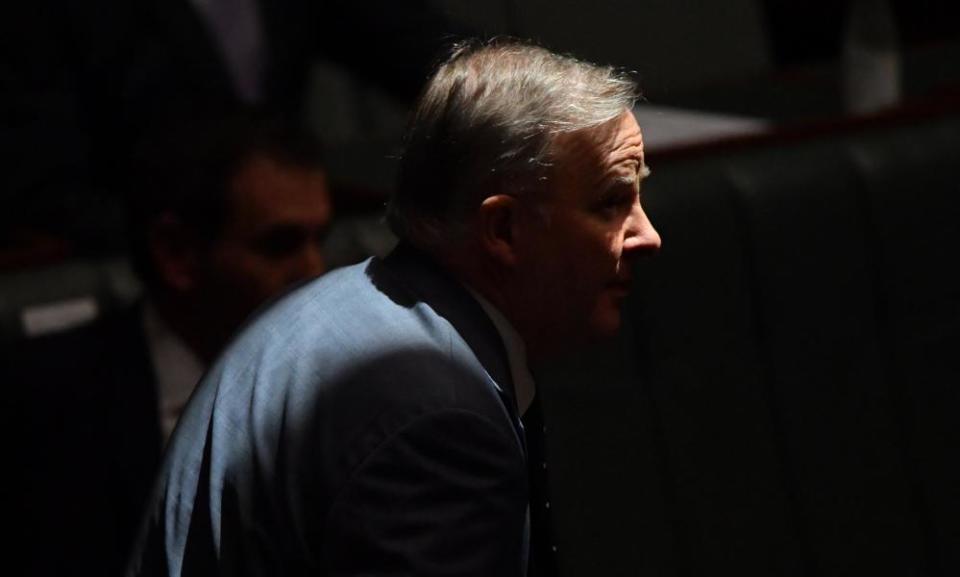Joel Fitzgibbon calls for changes to Labor's leader selection rules as Albanese finalises reshuffle

Veteran rightwinger Joel Fitzgibbon says Labor needs to consider changing the rules governing the selection of federal party leaders because the current system is “very untidy” – but he says his observation isn’t connected to “media hype about current leadership issues”.
Fitzgibbon told Guardian Australia on Thursday there was a case for overhauling the rules imposed by the former prime minister Kevin Rudd in an effort to stabilise the party’s “coup” culture. He characterised the current leadership selection process as “flawed”.
“I wouldn’t want to conflate this with current speculation about leadership but I think the rules are flawed in that they have the potential to allow someone to be the leader without the majority support of the caucus, and I think that’s very untidy,” Fitzgibbon said.
Related: Australia news live: Queensland to reopen border to NSW as Australia weighs up NZ travel bubble
Fitzgibbon said changing the leadership rules was “something that I think is worthy of consideration over time”.
The rightwinger’s intervention came as Anthony Albanese was facing the resumption of the parliamentary year amidst growing speculation about the viability of his leadership. Labor MPs believed the New South Wales leftwinger Tanya Plibersek was now openly positioning for the top job in the event there was a move against Albanese.
The Rudd rules, which allow grassroots party members a say in the selection of the federal leader, have imposed a period of stability on the Labor caucus over the past two parliamentary terms. But party insiders insist it is within the power of the caucus to change the current system.
Albanese is moving to shore up his position with a frontbench reshuffle ahead of the resumption of parliament next week. One of the leader’s key factional allies Mark Butler will be shifted sideways out of the climate portfolio in a bid to stem party infighting over emissions reduction.
Butler and Fitzgibbon have been engaged in a public brawl since Labor lost the last federal election about whether the party’s climate policy was too ambitious. Fitzgibbon, formerly shadow resources minister, quit the Labor frontbench last year after a blazing row with Albanese in shadow cabinet.
Under the refresh, Butler will be given the health and ageing portfolios, while the New South Wales right winger Chris Bowen, currently responsible for health, will become the shadow climate change minister.
Albanese announced on Wednesday night that federal Labor would begin the year with a shadow ministerial reshuffle, resetting priorities as he fends off mounting concerns he can’t defeat the Morrison government.
The Labor leader told ABC’s 7.30 program he would unveil on the weekend “a stronger team going forward with the right people in the right jobs” with fresh policies to follow within weeks.
Related: Anthony Albanese signals possible return to Labor's 2019 workplace policies
Albanese on Wednesday night defended his performance in 2020, arguing Labor had held the government to account during the coronavirus pandemic and led the debate in calling for wage subsidies, improved access to childcare and more Australian manufacturing jobs.
At the outset of the pandemic in March, the prime minister, Scott Morrison, recovered from poor polling during the 2019-20 bushfire season and has consistently led Albanese as preferred prime minister and on net approval.
Albanese argued “people have wanted leaders to succeed” because their health and jobs depended on it, but the next election would be a fight over who could deliver a “stronger economy, a fairer society, and deal with challenges such as climate change”.
Albanese said his leadership was “secure”, Labor was “very competitive” in the polls and was “very strongly positioned” to fight an election on those issues.
At the end of 2020, Labor trailed the government narrowly, by 49% to 51% on a two-party-preferred basis in Newspoll.
Although there is no clear alternative leader, Plibersek, the shadow treasurer, Jim Chalmers, and Bowen are considered potential candidates, along with the former leader Bill Shorten, who said on Sunday he had learned from taking too many policies to the 2019 election.
Albanese said Labor’s plans for jobs, more secure work, cheaper childcare, lower greenhouse gas emissions and recognition of First Nations people “will cut through” and “there’ll be more in the coming weeks”.
Asked what he hoped to achieve in the upcoming reshuffle – which had been slated for December but was delayed – Albanese said it would “show what Labor’s priorities are”.
“It’ll be announced at the weekend and I’m talking through with colleagues … I’m sure that will it achieve a stronger team going forward with the right people in the right jobs, and it will be, I think, a positive move.”
Albanese said his ambition was not about himself, but to ensure Labor won government “for the people who really need a Labor government” and for who “it makes a difference”.
The opposition leader also defended his proposal for a referendum on the Indigenous Voice to be held on 26 January to coincide with Australia Day.
He said it was a “constructive idea” rather than a “precise solution” that aimed to avoid the same debate every year over whether 26 January was an appropriate national day. The date marks the beginning of Indigenous dispossession in 1788.

 Yahoo Finance
Yahoo Finance 